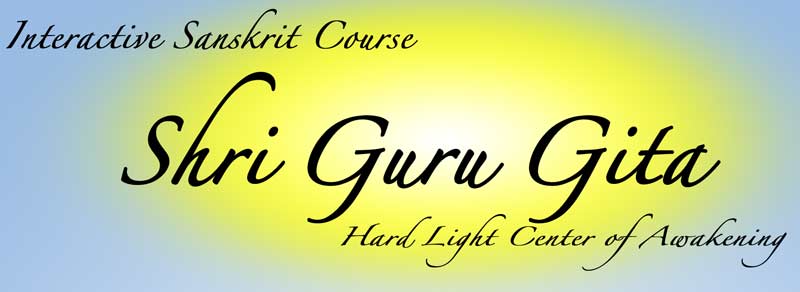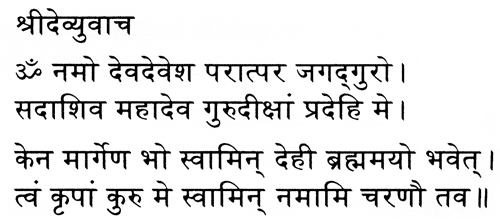
![]()

O Great Lord, O Ruler of all the worlds,
I long to know the path that will lead me to Awakening.
Please have compassion on me. Show me the
way, O Supreme Teacher of the Universe.
I bow
to your feet My Lord.

| Shri devyuvaccha | |
| shree day – vee – oo – vach – chu | |
Note: When we have a single 'c' in a Sanskrit word, it is pronounced like 'ch'. When we have a double 'cch' as we do here, try to get both 'ch' sounds in, one right after the other. It's a bit tricky at first, but if you practice them separately at first, then keep speeding it up, they will run together properly. Devi is the feminine form of the deity - The Goddess Parvati. Deva is the masculine form - Shiva. Uvacha means asks, speaks. When the 'i' at the end of devi runs into the 'u' of uvacha, it changes to a 'y' - a bit of Sanskrit grammar trivia for you to enjoy... |
|
| Om namo deva devesha | |
| om nu - mo day - vu day - vay - shu | |
Note: the e is pronounced like hay. Namo means to bow. The mantra Om Namah Shivaya for instance means I BOW to Shiva. Deva means God or the Divine. The ending devasha is emphatic, meaning the most holy of the holy, the most divine of the divine. |
|
| paraatpara jagad guro | |
| pu - raat - pu - ru ju - gud goo - ro | |
| Note: jagad means world or universe; para is supreme, parat is a superlative - beyond the beyond, so together they mean higher than the highest | |
| Sadaashiva mahaadeva | |
| su - daa - shee - vu mu - haa - day - vu | |
| Note: maha means great, and again, deva means divine. So mahadeva means the most divine. | |
| guru dikshaam pradehi me | |
| goo - roo dik - shum pru - day - hee may | |
Note: the 'i' can be short or long in Sanskrit - meaning it is held for a short duration or a long duration. In diksham it is short; at the end of pradehi it is long. Diksham means initiation. This is the key keyword of this entire verse. |
|
| Now combine the phrases above into one... | |
| Om namo deva devesha, paraatpara jagad guro; Sadaashiva mahaadeva, guru dikshaam pradehi me | |
| Kena maargena bho svaamin | |
| kay - nu maar - gay - nu bho swaa-min | |
Note: the consonant combination "bh" means there is a slight aspiration, as though you have extra air following the pronunciation of each consonant – bh is pronounced like 'abhor' In Sanskrit, the 'v' sound is sometimes hard and sometimes soft; soft meaning it's halfway between a 'w' and the hard 'v' sound we use in English. That's why sometimes you see this word spelled two ways: swami or svami. Kena means 'by which'; margena means path or road. So here Parvati is asking the key question to Shiva: by which path, O great swami... |
|
| dehi brahmamayo bhavet | |
| day - hee brah - mu - mu - yo bhuv - ate | |
| Note: Brahman is the Infinite Ocean of Consciousness (the 'n' and 'm' endings are equivalent grammatically here); bhavet is the verb to become one with. (Read about Parvati Bhava to get a sense of the meaning of Bhava). | |
| Twam krpaam | |
| twum kri - pum | |
Note: Again, we have a soft v/w sound. This could be written tvam or twam. in Sanskrit, there are two 'r' sounds - one that is a consonant, like our 'r', and another that is actually a vowel. Vowels have the purpose of helping you get from one sound to the next sound smoothly and easily. So when you see an 'r' before another consonant like the 'p' here, it's usually the vowel - give the 'r' a little roll of the tongue to lead it into the letters that follow. Sometimes it helps to imagine an invisible short 'i' after the 'r' sound, to help you say it. Twam means your; Kripa means grace |
|
| kuru may svaamin | |
| koo - roo may swaa - meen | |
| Note: the 'i' in svaamin is long in duration | |
| namaami charanau tava | |
| nu - maa - mee chu - ru - now tu - vu | |
| Note: namami means I bow (as in Om Namah Shivaya means bow to Shiva). Charanau means feet. Tava is like twam above, meaning your. | |
| And bring these last phrases together now... | |
| Kena maargena bho svaamin, dehi brahmamayo bhavet; Twam krpaam kuru may svaamin, namaami charanau tava | |
Now repeat the entire verse all together: |
|
| Shri devyuvaccha: Om namo deva devesha, paraatpara jagad guro; Sadaashiva mahaadeva, guru dikshaam pradehi me. Kena maargena bho svaamin, dehi brahmamayo bhavet; Twam krpaam kuru may svaamin, namaami charanau tava. |
|
| And with the keywords: | |
| Shri devyuvaccha: Om namo deva devesha, paraatpara jagad guro; Sadaashiva mahaadeva, guru dikshaam pradehi me. Kena maargena bho svaamin, dehi brahmamayo bhavet; Twam krpaam kuru may svaamin, namaami charanau tava. |
|
| The Goddess said: O Great Lord, O Ruler of all the worlds, I long to know the path that will lead me to Awakening. Please have compassion on me. Show me the way, O Supreme Teacher of the Universe. I bow to your feet My Lord. | |